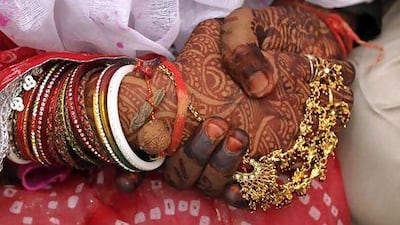At a tiny storefront in the bustling TNagar district in India's Chennai, a poster picturing maids, construction workers, carpenters, and hairdressers offers a tantalising promise: "No matter who you are, you can get married here happily."
That pitch last month enticed the mother of a 35-year-old electrician to drop by the store, one of the city's 25 Popular Matrimony outlets, to seek a suitable mate for her son.
"We have been searching for a match at temples and brokers for the past three years," says the woman, who would not give her name.
"One of these salespeople saw our ad in the newspaper and called us here, and we hope we can find a girl."
Such Indian parental anxiety has helped turn Matrimony.com, the owner of the Popular Matrimony chain and the Bharat Matrimony website, into a matchmaking powerhouse. The company, which has brokered more than 2 million marriages, helps parents arrange marriage by caste, complexion (dark to fair) and religious values (orthodox to liberal).
Its Elite Matrimony unit, an offline service for the wealthy who don't want their children's profiles floating around the Web, can cost up to 400,000 rupees (Dh27,069) for a three-month subscription that provides a "relationship manager" to help shortlist spousal candidates.
For the less affluent, who may not even have access to the internet, the company's Popular Matrimony unit is rolling out new products such as lists of 10 potential suitors for 1,000 rupees.
"Whether it's bottom of the pyramid, top of the pyramid, online, offline, the idea is that we need to help them find a suitable life partner," says the founder and chief executive Murugavel Janakiraman, who met his wife through the small marriage site he created before starting Matrimony.com.
"Marriages within the community is still very much the norm, and I don't see that changing."
The BharatMatrimony.com website has had 20 million customers to date, with 10 per cent finding partners via the site, according to Mr Janakiraman, who says he's signing up about 200,000 new customers per month.
BharatMatrimony.com operates much like IAC's Match.com, allowing users to post their profiles and indicate preferences for a would-be mate.
The key differences: marriage is the stated goal; many posts are managed by parents; and customers get directed to one of 350 regional websites focused on community or caste.
Indians long relied on family members or friends to set up matches. As communities have scattered or young people have moved abroad, many are turning to websites. Even younger Indians posting their own profiles on matrimonial sites typically search within home regions and castes.
Marriage is big business in India, given its population of 1.2 billion. The country accounted for 30 per cent of global gold jewellery demand in the third quarter last year, according to the World Gold Council. Much is bought for weddings, where brides are often covered with gold adornments. The researcher Netscribes in 2011 estimated the total value of wedding-related merchandise and services in India would hit 2 trillion rupees last year, after expanding 25 per cent in each of the previous two years.
That boom has helped boost sales at a host of companies. Jubilant Foodworks, which operates the Domino's Pizza franchise in India, began supplying pizzas to weddings in north India three years ago, and demand is growing at about 30 per cent a year, says Harneet Singh Rajpal, the vice president for marketing at Jubilant.
"In India, people spend their lives collecting money to spend on their weddings," says Neha Gupta, a senior research analyst at Gartner in New Delhi.
To get a bigger share of those dollars, Matrimony.com last year started a directory that, for a fee, lists wedding service providers such as printers of invitations, caterers, and florists.
The bottom line: matchmaking via the Web - much of it handled by parents - has become a big part of India's $37 billion (Dh135.89bn) wedding industry.
* Bloomberg News

